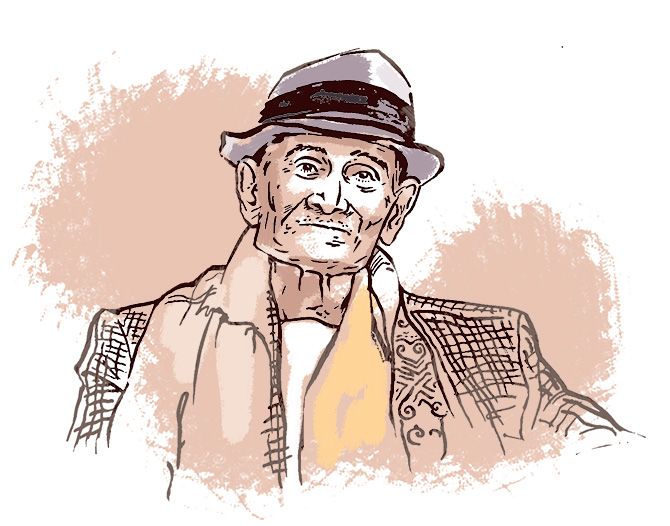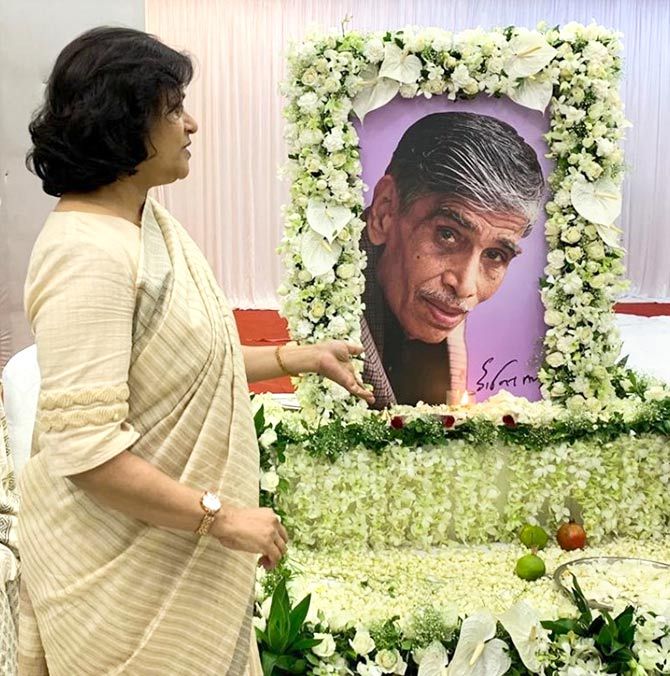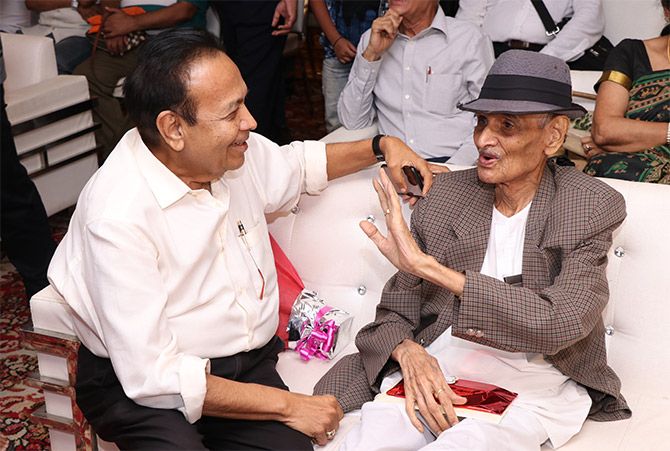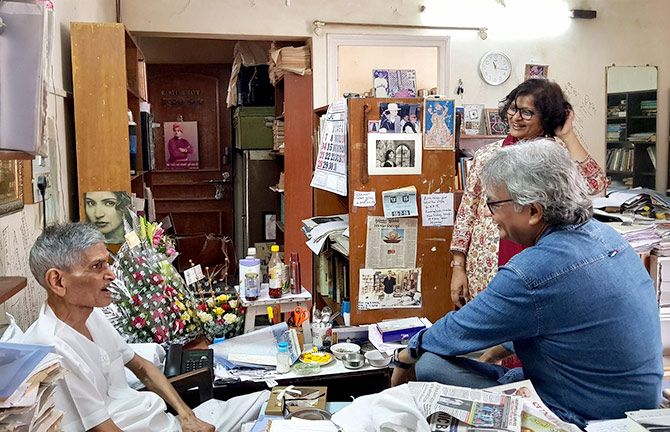Remembering journalist extraordinaire Kanti Bhatt.

When legendary Gujarati journalist Kanti Bhatt passed away on August 4, 2019, his army of devoted Gujarati readers took to Twitter to mourn the demise of a man whose prolific and varied writings coloured their growing years.
'Before Internet and electronic media, it was Mr Bhatt who gave us the glimpse of world. I used to read him since 1990 when I was in 4th grade. Abhiyan n Chetanani Kshane'.
'Kanti Bhatt's passing is a huge loss to journalism. He was an institution. He was curious about everything, and wrote on virtually every topic you can imagine. His work kept many Guj magazines alive. Versatile, prolific, industrious -- that was Kantibhai'.
'His newspaper columns since 1967 formed a part of the daily lives of every Gujarati including me'.
'Very very sad... Shri Kanti Bhatt enriched millions of minds through his highly informative columns on diverse issues and subjects. His words and works will continue to inspire us'.
Dr Prakash Kothari, founder professor of the department of sexual medicine at the King Edward Memorial Hospital and Seth Gordhandas Sunderdas Medical College, Parel, central Mumbai, knew Bhatt for over four decades.
He recalls to Vaihayasi Pande Daniel/Rediff.com the dramatic way in which his friendship with Kanti Bhatt began and the relationship that grew between them:
When I came from abroad, after doing my undergraduate and postgraduate workshop training with Masters and Johnson (Institute, St Louis, Missouri, USA, established by the famous sexologist duo William H Masters and Virginia Johnson), the editor of Chitralekha (the Gujarati weekly) asked Kanti Bhatt to interview me.
At that time there was another magazine known as Beej (Chitralekha's sister publication). He asked him (Bhatt) to interview me (for Beej) about what I did.
At that time sex was a new and very sensitive topic. Nobody would talk (about it then) -- I am telling you about (something that happened) 40 years ago or even earlier than that.
He (Bhatt) was sent to me. We had a great discussion. He was so well-prepared that I was surprised.
I thought (laughing) if there was anybody in India who could compete with me (in my field) it was this man! He was so thorough in his job.
In fact, I told the editor and complimented him that this man has done his homework so (well) and so many questions he has asked me. I was really impressed. That was one thing: He would work and do his job in a very thorough manner.
Whenever he would telephone me I would invariably pick up. In his entire career there was not a single telephone call where he has called me and I have not picked up...
Why? I knew it would be an interesting conversation. Two reasons. He wanted to educate people and in the process educate himself.

He cleared up a lot of myths, misconceptions and mis-directions about sex and sexuality (at that time) which were very, very common among Hindus.
One topic he discussed with me was brahmachari-ism or celibacy.
(He would say) 'So many people have written (about it). So many religions are there where there is celibacy. How come you are telling there is no need for celibacy?'
Then I had to explain to him that semen is being manufactured to be excreted. Not for being stored up and that too 24 by 7. You can't hold urine. You can't check perspiration. Similarly, semen also you can'y hold it.
I gave examples of the Vedas. That there are three varieties of maithula or intercourse -- one is maithun. That is with the female. The second is hasthmaithun -- that is intercourse with the hand, masturbation. Third is dreams or sapnamaithun -- what we call sleep emissions.
Still he would ask me: 'My readers won't get convinced. Give me something which is very solid'.
I had to tell him look -- Ram, Krishna, Mahavir, Buddha, Mohammad -- all were married. Brahma, Vishnu, Mahesh. All were married.
Then he got convinced...
(I would say): 'You want that the god should be married and his bhakto, his devotee should remain bachelor. Why?'
(After that) he would write with full swing. He was a person who unless he is convinced, he will not write. With me he would get convinced.
He would (in his columns) talk about Ayurveda, talk about naturopathy. Whatever he believed in, he wrote. Whatever he wrote, he practiced. That was basically naturopathy.
Most of his columns were on general topics... Quite (long ones). Quite thought provoking. His columns were rated as quite good. People respected them.
Yes, he was (in his columns) talking to the masses. Yes, chatty.

Some were very provocative also. Or chetna nikshane which means inspiration from moments of life. Those columns were very popular. He would raise topics which were controversial.
One had to think (when one read) what he wrote, you know. He would try to convince (the reader) in a particular way (direction). At the same time he was like a good counselor -- never imposed his values on his readers. That was the good thing about him.
Sometimes they were newsy. Sometimes they were on diet. Sometimes they were on religion. He has written on almost all subjects.
In person he had fixed ideas. But he was a true friend. (There was one) incident (40 years ago) where myself, Swami Satchidananda (religious teacher and yoga master), Chandrakant Bakshi, who was a very famous and well-respected writer in Gujarati and Kanti Bhatt -- we all were sitting on the dais at the Bharatiya Vidya Bhavan (Mumbai) discussing, I think, sexuality and religion.
Somebody asked a question and Chandrakant Bakshi goofed it up. He was wrong. But Kanti Bhatt in his reply protected him completely and saved him.
While leaving the hall Chandrakant Bakshi told me these words in Gujarati 'Kanti sacho dost che', meaning Kanti is a true friend.
He was a very lively person.
Yes, mentally lively and he (had) few friends, but good friends and he would die for them and he would also expect they should die for him!
Kanti Bhatt had fixed ideas about certain kinds of rice which grow in 60 days. And they are available only at Khandala. Easily digestible. So when I went there he would insist that I get this raw rice for him.
He would not hesitate in asking favours of true friends. At the same time he would tell you things (straight) to your face. He would not hesitate or bother for anything (being a plain speaker).
A very jovial person. He had very fixed ideas -- where he believes and he wants others to believe (laughs). You have to (judge) his mood and talk (start a discussion). Then he was like a child -- very amicable about most of the things if you explained them to him.
He was very fond of ghazals. We had this common interest. So am I. He would listen to them. He (once asked me) in an interview: 'How come sexuality and ghazals are connected. How come? Why?'

I gave him a simple example -- Two lines make a sher or couplet. Similarly two individuals make an encounter. Several such shers, when collected together, form a ghazal and several such encounters a relationship. That's how I would compare sexuality with ghazals. He would get amused.
I will tell you one thing: He was a Google at that time!
Google came now.
He was a Google (then).
He would know everything. And from where he would get! He was a real miser person otherwise, but for books and all these things he would spend any money.
'Woh leke ao, yeh le ke ao (Bring this book or that book).' He had total information (at his fingertips). You would be surprised.
What information you get after going through Google he used to provide at that time. This is a universal opinion about him.
Lot of curiosity. Absolutely, he was ahead of his time. He had guts to write. Not just foreguts, midguts or hindguts -- but real guts to write.










